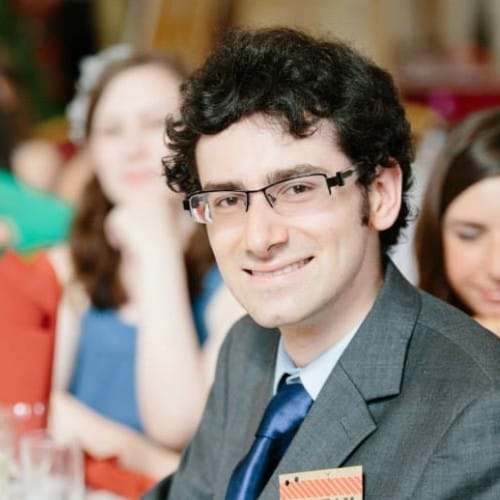Green jobs for physics graduates: finance and economics
11 Oct 2021 Laura Hiscott
Taken from the October 2021 issue of Physics World. Members of the Institute of Physics can enjoy the full issue via the Physics World app.
With their mix of technical knowledge and problem-solving skills, physics graduates are ideally placed to tackle the world’s environmental challenges. In the fourth of a series of articles, Laura Hiscott speaks to three physicists who are doing their bit to build a greener, more sustainable future in the field of finance and economics

Rustam Majainah, senior pricing analyst, OVO
Green energy might appear to be all about feats of engineering, but integrating those breakthroughs into society involves many other challenges too, not least from a financial and economic point of view. This is another area where physicists can play a key role. Just ask Rustam Majainah, a physics graduate who now works as a pricing analyst at OVO, the UK’s largest independent energy supplier. Rustam Majainah is a senior pricing analyst at the energy supplier OVO. (Courtesy: Rustam Majainah)
Rustam Majainah is a senior pricing analyst at the energy supplier OVO. (Courtesy: Rustam Majainah)
 Rustam Majainah is a senior pricing analyst at the energy supplier OVO. (Courtesy: Rustam Majainah)
Rustam Majainah is a senior pricing analyst at the energy supplier OVO. (Courtesy: Rustam Majainah)After studying physics at Royal Holloway, Majainah did a Master’s in renewable energy and sustainability at the University of Reading, UK. In the summer between his BSc and Master’s programme, he did a placement at the Chippenham-based renewable-energy company Good Energy, which he found through the South East Physics Network (SEPnet).
In his job at OVO, Majainah uses numerical models to determine the cost of energy. This involves considering many factors, including the cost of generation, the use of cables that bring the energy to people’s homes, and social levies such as the warm home discount, which supports vulnerable customers. “I think energy supply is often a forgotten part of the green transition,” says Majainah. “You’ve got the energy generators and networks on one side, and everyday people on the other, and energy suppliers sit in the middle and try to match them up.”
Majainah points out that it’s a time of change in the industry. “With the innovation of smart meters, we’re moving from a system where you give your supplier one reading per quarter to one where we can get that data at a half-hourly level,” he says. In moving to more granular charges, OVO can use that data to pass on savings to their customers if, for example, the wind is blowing and turbines are generating energy, or if electricity is cheap at certain times. More granular charges can also be used to “flatten” energy usage peaks by charging customers less for energy at quieter times, and part of Majainah’s role is looking at the wider policy around that.
“It’s a prickly point,” he explains, “because if energy is cheaper at some times and more expensive at others, how do you encourage customers to change their consumption patterns without unfairly impacting people who don’t have the flexibility to do that?” OVO also looks at kitting people’s homes out with electric vehicle chargers, using vehicle-to-grid technology that allows cars to export energy back into the grid when local demand increases.
All of these challenges require people with numerical and analytical skills, which a physics degree gives you a strong grounding in. Additionally, Majainah says that skills in data-analysis programming languages such as Python, which many physics degrees teach, are highly sought-after in the energy sector. “We’re going through big systems transitions,” he says, “so there are plenty of opportunities at OVO and in the industry in general.”
Flora Biggins, PhD student, University of Sheffield, UK
Since wind and solar energy depend on the weather, and are not necessarily being generated most at the times when consumers are using the most electricity, energy storage is a key component of embedding them in our networks. But developing this capacity requires financial investment. Flora Biggins is a PhD student at the University of Sheffield, working on incentivizing companies to invest in green solutions. (Courtesy: Ian Spooner)
Flora Biggins is a PhD student at the University of Sheffield, working on incentivizing companies to invest in green solutions. (Courtesy: Ian Spooner)
 Flora Biggins is a PhD student at the University of Sheffield, working on incentivizing companies to invest in green solutions. (Courtesy: Ian Spooner)
Flora Biggins is a PhD student at the University of Sheffield, working on incentivizing companies to invest in green solutions. (Courtesy: Ian Spooner)Flora Biggins, a PhD student at the University of Sheffield, is working on incentivizing companies to make these investments. After graduating with a physics degree from Imperial College London, she decided she wanted to do research relating to sustainability. “I wanted to use my problem-solving skills to work on solutions to climate change, which is the biggest challenge we face,” she says, “and energy storage is really important for decarbonizing electricity.”
Biggins’ research involves creating computational models that use machine learning to predict how prices of energy-storage technologies such as batteries and green hydrogen will evolve over time. She can then use these predictions to advise companies on how to invest in order to maximize their profits, for example by buying the right kind of batteries, or by using batteries to store energy and then sell it on when prices are higher.
I wanted to use my problem-solving skills to work on solutions to climate change, which is the biggest challenge we faceFlora Biggins
In addition to advising companies, Biggins’ work also informs policy. “If I find that energy storage is not very profitable, then it’s important for government organizations to know that,” she explains. “They might respond by introducing subsidies to encourage investment until prices drop to an affordable level.” Predicting future prices is very difficult, as there are numerous factors to consider that are constantly fluctuating. Future prices of green hydrogen are especially tricky to forecast, as it is relatively new, so doesn’t have much historical data to use as a starting point.
To tackle these challenges, the mathematical and computational skills Biggins developed during her physics degree are essential. Besides these technical skills, she says resilience is also necessary to keep going when things don’t go as planned, and she finds that having a positive solutions-focused project helps to motivate her. “It feels good to be working on something that is going to benefit society.”
Lewis Ashworth, programme manager, Institutional Investors Group on Climate Change
Many physics graduates go into careers in finance, which are another way of influencing how money is invested, and there are green options within this sector too. Lewis Ashworth, for example, is a programme manager at the Institutional Investors Group on Climate Change (IIGCC) – a membership body that supports shareholders to drive forward sustainability in the companies they invest in.
As part of his physics degree at the University of Sheffield, Ashworth did a year abroad at Monash University in Melbourne, Australia, during which he took courses in climate dynamics of the atmosphere and oceans alongside pure physics. “That opened my eyes to climate change,” he says, “so when I graduated I decided to do a sustainability-focused Master’s degree.” Lewis Ashworth is a programme manager at the Institutional Investors Group on Climate Change, which works to ensure that large companies reduce their emissions. (Courtesy: Lewis Ashworth)
Lewis Ashworth is a programme manager at the Institutional Investors Group on Climate Change, which works to ensure that large companies reduce their emissions. (Courtesy: Lewis Ashworth)
 Lewis Ashworth is a programme manager at the Institutional Investors Group on Climate Change, which works to ensure that large companies reduce their emissions. (Courtesy: Lewis Ashworth)
Lewis Ashworth is a programme manager at the Institutional Investors Group on Climate Change, which works to ensure that large companies reduce their emissions. (Courtesy: Lewis Ashworth)Ashworth did an MSc course on environmental technology and energy policy at Imperial College London before starting his role at IIGCC. He now works on several projects, including an initiative called Climate Action 100+, which seeks to ensure that the 167 largest greenhouse-gas-emitting companies in the world reduce their emissions to be in line with the goals of the Paris Agreement.
Other programmes that Ashworth works on include educating shareholders on how they can influence the companies they invest in, for example by filing shareholder resolutions or voting against directors. He is also helping to develop a benchmarking process to assess companies’ progress towards the goals of the Paris Agreement. This uses various indicators, such as whether the companies have set net-zero targets.
Ashworth regularly does presentations to colleagues and investors as part of his job, so communication skills are essential, alongside an understanding of the statistics and data that he is presenting. He finds his physics background gives him confidence in understanding the various topics he speaks about, from electric vehicles to using hydrogen to decarbonize the steel industry. “As a physicist, these are not alien concepts,” he says, “so it’s nice to feel confident in your ability to decipher what’s going on.”
One common challenge facing people like Ashworth who work in sustainability is that they have high aspirations for making change, but often face barriers and find progress to be slower than they would like. “But when something big happens,” he says, “like a company announcing that they are going to commit to a target that you have been pushing for, and you know you were part of it, that’s when you know you are really making a difference.”
from physicsworld.com 11/10/2021
Δεν υπάρχουν σχόλια:
Δημοσίευση σχολίου